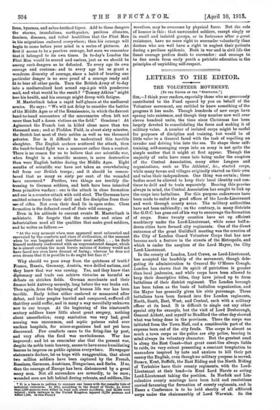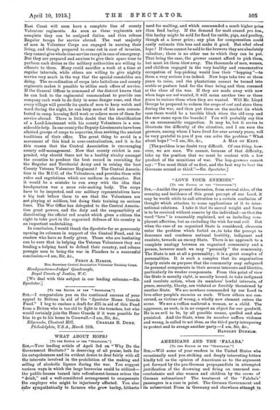LETTERS TO THE EDITOR.
THE VOLUNTEER MOVEMENT,
rro Tar Zones Or UM "Srcereroh." J
think your readers, especially those who so generously contributed to the Fund opened by you on behalf of the Volunteer movement, are entitled to know something of the progress it has made. Though hundreds of new corps have sprung into existence, and though they number now well over eleven hundred units, the time since Christmas has been largely devoted to consolidating the force and making it of military value. A number of isolated corps might be useful for purposes of discipline and training, but would be of little value to a General faced with the task of repelling an invader and driving him into the sea. To shape these self- training, self-managing corps into an army is not quite the simple matter that it might at first appear. Though the majority of units have come into being under the auspices of the Central Association, many other Leagues and organizations, such as The Athletes', &c., started corps, while many towns and villages originally started on their own and value their independence. One thing was certain ; these bodies must be allowed to keep their local identity and con- tinue to drill and to train separately. Bearing this proviso always in mind, the Central Association has sought to link up the corps into battalions. For this purpose endeavours have been made to enlist the good offices of the Lords-Lieutenant and work throne' county areas. The military authorities have not been unfriendly ; on the contrary, in many districts the G.O.C. has gone out of his way to encourage the formation of corps. Some twenty counties have net up efficient machinery under the Lord-Lieutenant, while some half-a- dozen cities have formed city regiments. One of the direct outcomes of the great Guildhall meeting was the creation of the City of London Guard Volunteer Corps that has now become such a feature in the streets of the Metropolis, and which is under the =vices of the Lord Mayor, the City Lord-Lieutenant.
In the county of London, Lord Crewe, as Lord-Lieutenant, has accepted the headship of the movement, though dele- gating its administration to General Sir O'Moore Creagh. London has shown that its spirit of patriotism is greater than local jealousies, and while corps have been allowed to keep their descriptive titles, they have joined up to form battalions of their district regiment. The London borough has been taken as the basis of battalion organization, and the Mayor has generally given his civic patronage. These battalions have been formed into five London regiments, North, South, East, West, and Central, each with a military officer at its bead. It is difficult to single out any other special city for example, but the visit of Lord Desborough, General Abbott, and myself to Bradford the other day showed what was being done in the provinces. There the corps was initiated from the Town Hall, and a considerable part of the expense born out of the city funds. The corps is almost as much a town corps as the police are city police, bearing in mind always its voluntary character. But the greatest need is along the East Coast—that great coast-line always liable to raids, its very extent presenting a constant temptation to marauders inspired by hate and anxious to kill their pet enemy the English, even though no military purpose is served. Sussex, Kent, Suffolk, the East Riding and the North Riding of Yorkshire have their county regiments, with the Lord- Lieutenant at their head—in Kent Lord Harris as acting Lord-Lieutenant taking the position. In Norfolk and Lin- colnshire county meetings have been held and resolutions carried favouring the formation of county regiments, and in Essex a Conference is to be held shortly of all affiliated corps under the chairmanship of Lord Warwick. So the East Coast will soon have a complete line of county Volunteer regiments. As soon as these regiments are complete they can be assigned duties, and thus release Regular troops for service abroad. The vast majority of men in Volunteer Corps are engaged in earning their living, and though prepared to come out in case of invasion, they cannot give whole-time service except in case of emergency. put they are prepared and anxious to give their spare time to perform such duties as the military authorities are willing to allocate to them. Many could sacrifice a week at a time at regular intervals, while others are willing to give nightly service very much in the way that the special constables are doing. The co-ordination of corps into battalions and county regiments makes it possible to utilize such offers of service. If the General Officer in command of the district knows that he can look to the regimental commandant to provide one company each week to do duty in some danger zone, and that every village will provide its quota of men to keep watch and ward during the night, he can keep more of his men concen- trated in camp learning field work or relieve more of them for service abroad. There is little doubt that the identification of a Lord-Lieutenant with his county Volunteers is a con- siderable help. In one county the Deputy-Lieutenants have been allotted groups of corps to supervise, thus reviving the ancient traditions of their office. The great thing to avoid in a movement of this kind is over-centralization, and it is for this reason that the Central Association is encouraging county self-management. Now that county cricket is sus- pended, why should there not be a healthy rivalry amongst the counties to produce the best record in recruiting for the Regular and Territorial Army and in raising the best County Veteran Volunteer Regiment ? The Central Associa- tion is the M.C.C. of the Volunteers, and provides them with rules and regulations which are uniform in character. But it would be a mistake to run away with the idea that headquarters was a mere rule-making body. The corps have to be inspected, and our military representatives have a big task before them to see that the Volunteers are not playing at soldiers, but doing their training on serious lines. The War Office has delegated to the Central Associa- tion great powers, and the duty and the responsibility of distributing the official red armlet which gives a citizen the right to take part in the organized defence of his country is an important undertaking.
In conclusion, I would thank the Spectator for so generously opening its columns in support of the Central Fund, and its readers who have so freely given. Those who are hesitating can be sure that in helping the Veteran Volunteers they are lending a helping hand to defend their country, and release younger men to bring the war in Flanders to a successful conclusion.—I am, Sir, &c., PERCY A. HARRIS, Hon.Socretary Central Association Volunteer Training Corps. Headquarters—Judges' Quadrangle,
Royal COILria of Tuetice, W.C.
[We deal with this subject in our leading columns—En. Spectator.]







































 Previous page
Previous page